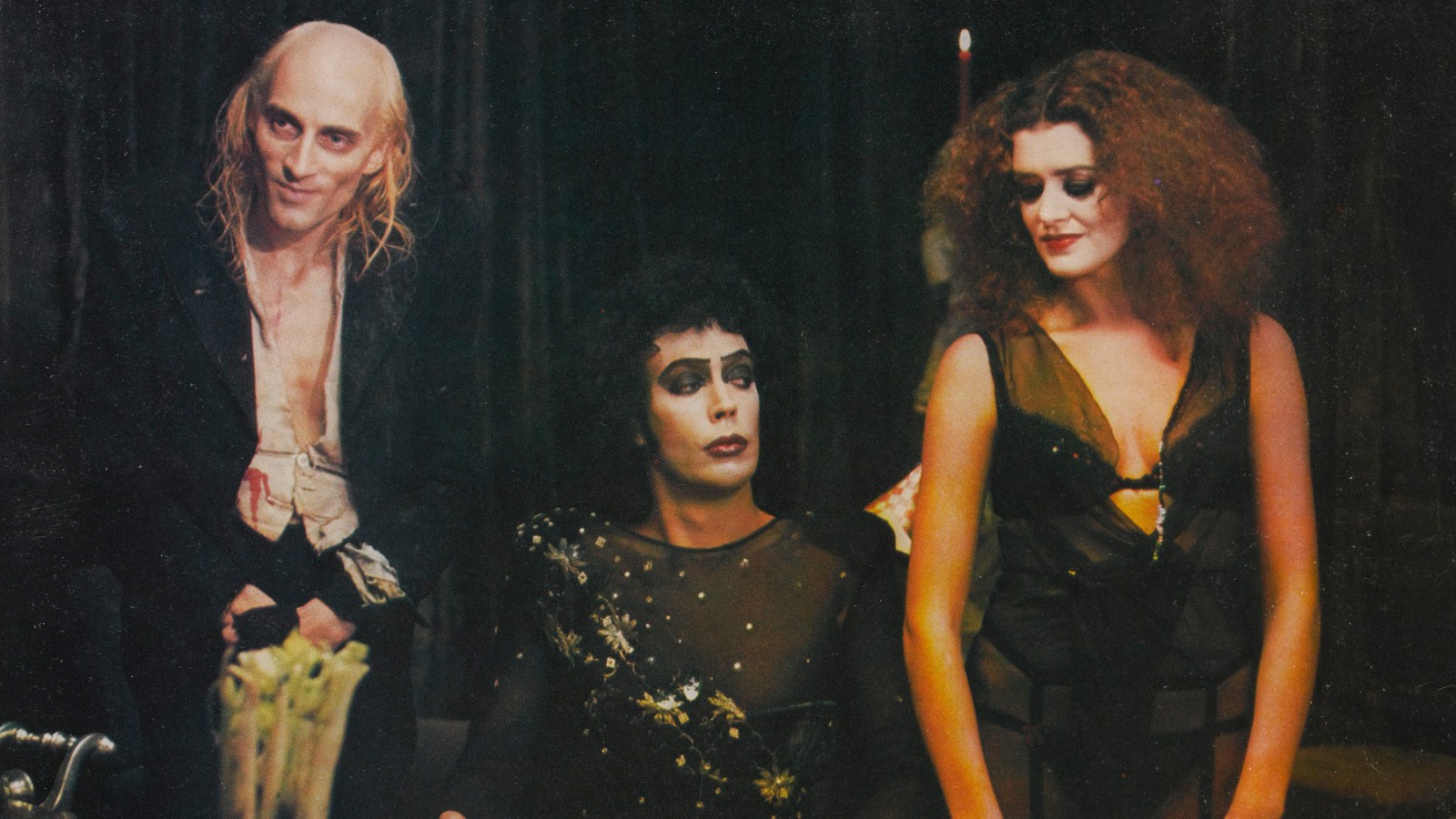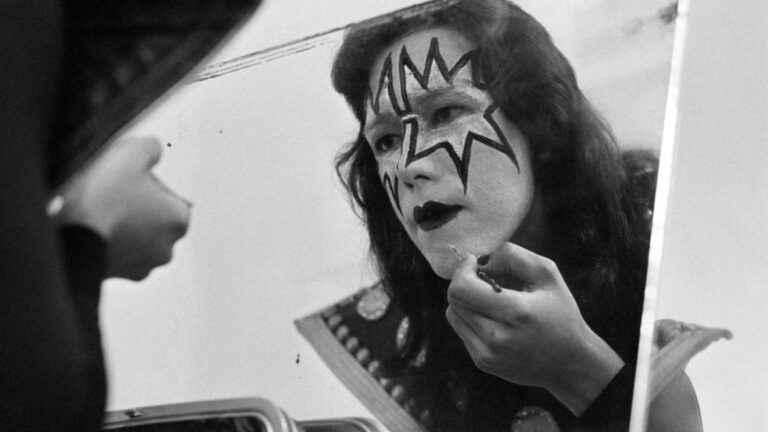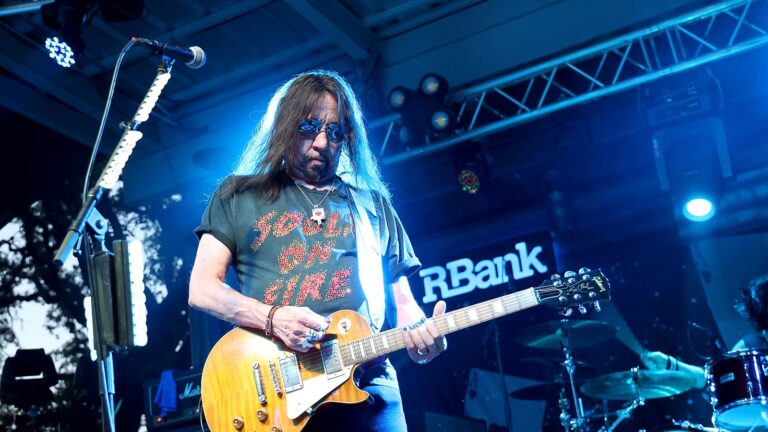“Rocky Horror is not just a movie. It’s a fucking gateway drug,” NOFX frontman/punk impresario Fat Mike told the sold-out crowd at Los Angeles’ Grammy Museum on Oct. 15. “It makes people feel like not only can they be different, but it’s better to be different. I would listen to Rocky Horror, try on my mom’s clothes, and sing every word,” recalled the 58-year-old of his nine-year-old self. At 14, he went to the Tiffany Theatre in West Hollywood for a midnight screening, a rite of passage that’s since been repeated by millions around the world following The Rocky Horror Picture Show’s 1975 debut. “That was it. I was transformed. I didn’t feel so alone. I felt like there was a place in this world for me,” he said.
Fat Mike’s sentiments were clearly shared by the audience, who gathered at the museums’s Clive Davis Theater that evening to celebrate the 50th anniversary of The Rocky Horror Picture Show. The intimate crowd was joined by Tim Curry, Lou Adler, and David Foster for a conversation on the cult film’s generation-spanning impact, while Fat Mike moderated the discussion.
As Curry, the “sweet transvestite” Dr. Frank-N-Furter in the film, entered the theater, fans rose to their feet, some teary, and cheered loudly. In a wheelchair since a 2012 stroke, the 89-year-old icon was still sharp as a tack — as numerous bon mots proved — with a vivid memory matched only by his dry humor. He joked about L.A. traffic, called the U.K.’s Queen Camilla a “frump,” and revealed that in the U.K. stage rehearsals, he initially was playing Frank-N-Furter with a German accent. Until, that is, Curry overheard a woman on the bus and had a lightbulb moment. “I thought, ‘That’s the voice. That’s who he really is. He’s a hostess without any guests who wants to sound like the Queen and be like the Queen… or be a queen.’”
Gratitude for the film’s life — and lifestyle — affirming contributions and Curry’s role as the over-the-top sexy mad scientist clad in satin panties and fishnet stockings — was shown from the both the audience and speakers, including The Rocky Horror Picture Show executive producer Adler, termed by Fat Mike as a “visionary, a California dreamer.”
It was at Adler’s Roxy Theatre where the stage production made its U.S. debut in 1974, after Adler saw it in London at the urging of his then-wife, actress Britt Ekland.
Foster, a 16-time Grammy-winning composer known for commercial songs and production for acts including Chicago, Michael Buble, and Celine Dion, spoke of his role as a 20-year-old keyboard player for the Sunset Strip production. “My whole experience with the Roxy Theatre, The Rocky Horror Show, was such a phenomenon, such a big part of my life. And here we are, 50 years later, talking about it. So thank you.”
Foster turned to his left, looking at Curry as he told the crowd, “Every night this man left it all on the stage. I watched it for one year and two weeks. And my God, the people that came to see this show, there’s Michael Jackson, Elizabeth Taylor, Dustin Hoffman. I mean, the list of celebs was just phenomenal.”
That said, Curry and Adler, now 91, both recalled screening the film version for 20th Century Fox distribution. There was a stunned silence among the room’s 60 or so executives when Curry revealed, “We crept out of the room.”
Ultimately, Adler says, “Although we never put any money, no marketing into it, the lines that were being said [to the screens by the audience] at the Waverly Theater in New York were being said in Austin, and in Cleveland, they were just natural.” A literal word of mouth.
It was a teacher named Louis Farese Jr. who was apparently the first to talk back to the screen, Adler said, yelling to Janet (Susan Sarandon), “Buy an umbrella, you cheap bitch.” The called-out responses to the screen and the “shadow cast” who act out favorite characters in movie theaters were simply a “natural instinct.”
This fan fanaticism and interaction that led to its midnight-movie cult status have helped make The Rocky Horror Picture Show the longest-running theatrical release in history. With a blend of high camp, pre-punk, and equal parts parody and tribute to science fiction, horror films, and music of the 1950s, the film more than earned its place in the Library of Congress.
It even influenced the late Diana, Princess of Wales, and Curry recalled her and Prince Charles attending a stage play he was in post-Rocky Horror. “They wanted to meet us, so we all lined up. She was introduced to me, and she said: ‘You were in the Rocky Horror Show,’” said Curry. “And I said, ‘Yes, well, I don’t suppose you saw it, ma’am.’ And she said, ‘Indeed, I did. It quite completed my education.’”
Richard O’Brien, creator and composer of the musical play the film is based on (and who also featured as Riff Raff on-screen), wasn’t on the evening’s panel, but all agreed that it was his songs, arising from a genuine love and knowledge of early British rock and glam, that proved a major hook.
“I think the difference in Hair and Jesus Christ Superstar is that the writers were trying to write rock and roll. They were theater writers. And Richard, he was the source,” says Adler. “He was the truth. He loved rock and roll, and he was able to make it so the play didn’t stop for the song, it just kept it moving along. It was the storyline.”
As for a revelation that still demands further clarification? Both Curry and Adler recalled O’Brien telling them that the song title that also serves as the film’s de facto soul/motto — “Don’t Dream It, Be It” — was nicked from an advertisement. However, no one seemed to remember just what product it was promoting.
“Those words — ‘Don’t Dream It, Be It’ — gave me the courage to live my life exactly how I wanted to, and I have,” Fat Mike said. “If I never saw Rocky Horror, I don’t want to think what my life would be like now, and how many other millions of people feel the same way. Who would have ever dreamed that a movie could mean so much to so many people? Well, the people on stage,” he said, looking to the panel. “They did. They realized it. They didn’t just change millions of people’s lives. They fucking saved millions of people’s lives.”
Curry, who released his Vagabond: A Memoir this month, proved gracious in answering questions from audience members — one of whom was crying, while another woman said, “When I first saw you come down that elevator [in the film] when I was 14 years old, I thought you were the most beautiful creature I’d ever seen. Looking at you today, I feel the exact thing.”
The rapt audience cheered Curry again as the panelists considered the film’s legacy, and what its status might be another 50 years hence. “It seems that whenever the Rocky Horror Picture Show is needed because of some social situation, it rears its head,” Adler said. “And I think it always will. When it is needed — as we are aware of today — it’ll be there.”
“When the forces of conservatism get too strong,” Curry chimed in. “A friend of mine in England sent me an email saying, ‘Why are you still living there [in America]? How is it to live underneath the Tangerine Messiah?’”
As for his personal legacy, Curry decried his singing and dancing talents while the audience volubly protested. “I think it’s [Rocky Horror], because it’s unavoidable that it should be,” he concluded. “But I’m very, very proud of it. So if it is my legacy, I’m very happy.”



